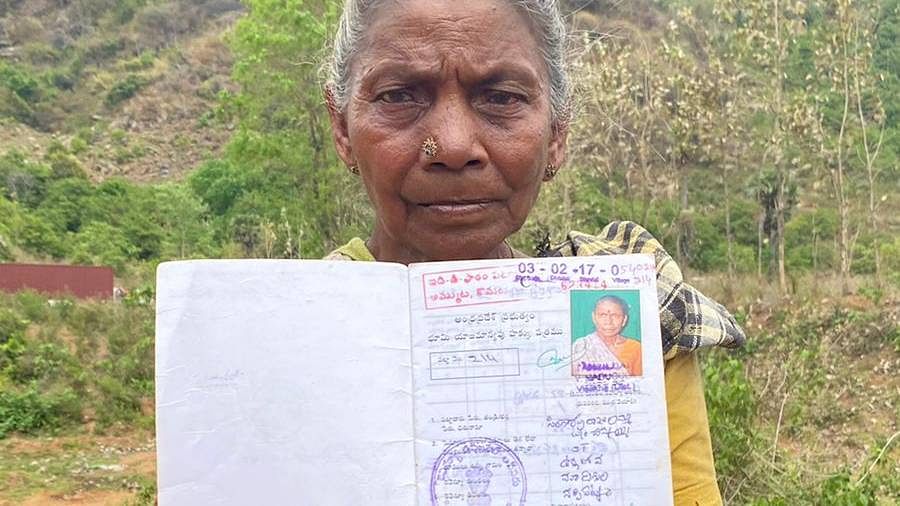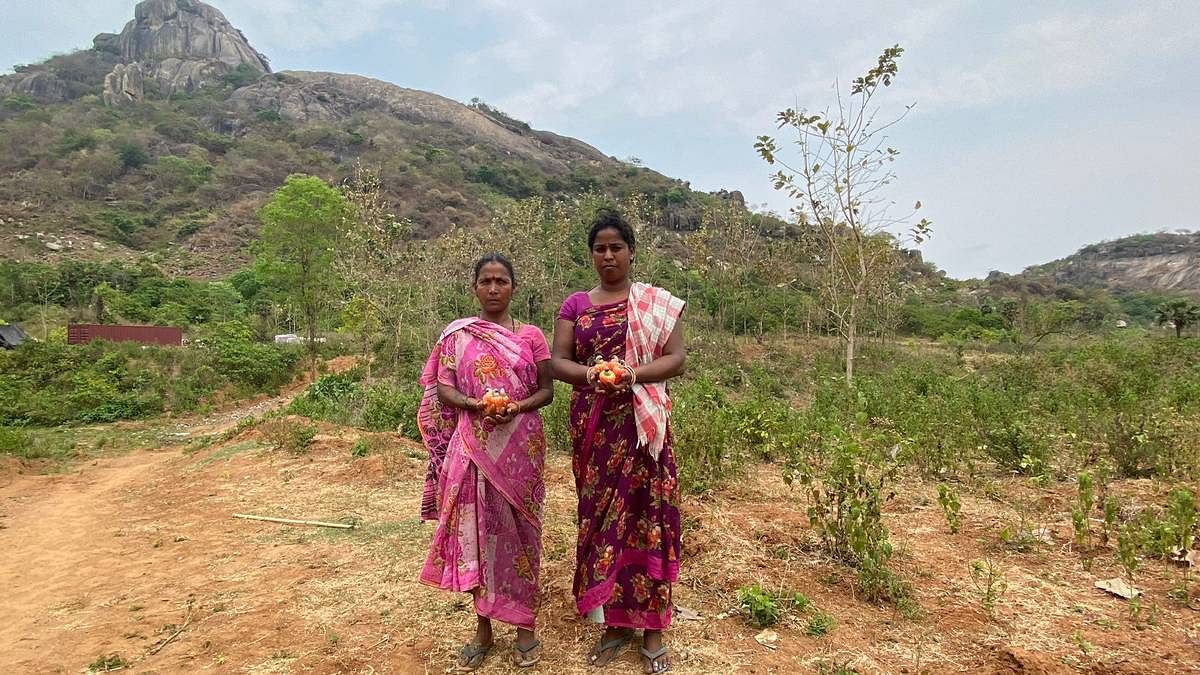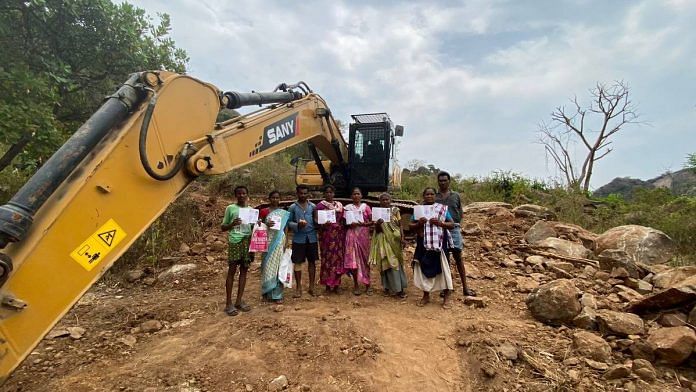Vuralova: Two weeks ago, Thokkala Lakshmi, 35, from Andhra Pradesh’s Komira village, along with a group of women farmers, tied a noose around her neck and stood near a tree in a mock suicide protest “to save her land”.
“What do we do? If our lands are gone, then death is the only option for us,” she told ThePrint. “They (the government) call us encroachers, but we are Konda Doras (‘Konda’ meaning hill, and ‘Dora’ meaning lord). We live on the hills and work here, this has always been our life,” the cashew farmer said.
Lakshmi, along with others of her tribe, has been waging a battle in the nearby Vuralova Hill against the local authorities and a private mining company.
Vuralova Hill is tucked away in the interiors of V. Madugula mandal, which is under Anakapalle district after reorganisation. It is an uninhabited village with no proper demarcation or revenue records with the authorities. The farmers here are residents of Komira village, which falls in another mandal, but they cultivate cashew on Vuralova. The trek to the hill from the village is about 4 kilometres.
A group of tribal farmers is up in arms against the local authorities and a private mining company, which, they say, was given a section of “their land” on lease for mining. This piece of land is where the farmers claim they have been cultivating cashews for the past many decades.
But the bone of contention between the parties is who has rights over the land.
The local authorities deny that the farmers have been cultivating the disputed piece of land, and say the mining company was given the plot on lease after thorough checks.
Speaking to ThePrint, mandal revenue officer P.V. Ratnam insisted that the land in question was found to have had no cultivators assigned when an inspection was conducted in 2014, and said “these farmers are all recent encroachers”.
“Definitely these protesting tribal farmers don’t have their lands here. They have it elsewhere on the hill,” he said. “There are cultivators on other parts of the land on the hill and these people, too, have been given lands on the other side of the hill. The area which has been allotted on lease to the mining company is not part of any assigned land.”
Even as the row festers, experts attribute disputes like these to deficient record-keeping with respect to Andhra villages — a deficiency that they say could be depriving tribals of their land rights.
Also read: Sex trafficking & rape horror in Andhra: How case of Dalit teen busted ring of 65 men & 15 women
The bone of contention
Vuralova is a single hill with an area of 3109.5 acres — with the land classified as ‘Hill Poramboke’, meaning “lands with no proper revenue records”, which are mostly considered government property.
In 2012-2013, about 444.26 acres on this hill were assigned to 314 families of Komira village, according to government records accessed by ThePrint. About 76 of the families were Scheduled Tribes.
The piece of land in dispute now is about 44 acres or 18 hectares that a private company called Sri Lakshmi Narasimha Granites has taken on lease.
In 2012, the farmers who were assigned land on the hill were issued D-Pattas — under which landless economically backward people are given government land for “cultivation only”. However, it is not clear where exactly the land of the D-Patta-holders lies on the hill, or if coincides with the disputed 44 acres.
Sale or transfer of ownership of D-Patta land is prohibited as it is considered government property.
The villagers who use the hill for farming majorly depend on cashew cultivation as their source of income. “We earn Rs 3 lakh per year by selling cashew. The yield season is just three months in a year and the rest of the time goes in maintaining the plants and clearing land for cultivation,” said Solam Satyavathi, one of the protesting women tribal farmers, who claims her land falls under the disputed 44 acres.
About 19 farmers claim they have been cultivating cashews on the land that has been given on lease to the mining company.
According to Narsipatnam Revenue Divisional Officer Govindha Rao, the mining company reached an agreement with four farmers who were “encroaching on the leased land” and a settlement was made accordingly.
Officials say that, other than these four, no other farmers have been assigned lands in that particular area or are in encroachment.
According to a 2015 joint inspection report — one of the documents accessed by ThePrint — the then revenue divisional officer said the 44 acres of (disputed) land “does not have any encroachments or there are no assignments on that land”.
This inspection report was used to issue a no-objection certificate to the mining company’s application for lease.
In 2013, Kurnool-based Sri Lakshmi Narasimha Granites filed the application seeking to lease land on Vuralova for mining. The company also obtained environmental clearance and approval from the Deputy Director of Mines. It obtained a lease in 2018, agreeing to pay Rs 1 lakh per hectare.
Ratnam also filed a report in 2015 saying that a gram sabha (village-level meeting) was held with nearby villages including Komiri village and “the locals had given no-objection clearance to a mining company operation in the vicinity”.
But Nageshwar Rao, Thokala Lakshmi’s husband, told ThePrint: “There was never any village-level meeting, never any discussion with us in the last few years. We did not agree to any mining company here. They’re lying.”
“The private company came to an agreement with four farmers and paid them lakhs of rupees. When we asked for a settlement, they said our lands are not here at all and called us encroachers,” he said. “If we are encroachers, the other four farmers are the same. They asked us to leave this place saying we do not have the necessary documents. Where do we go now?”
‘No major cashew plantations till 2014’
According to mandal revenue officer Ratnam, “farmers encroached upon the land given to the mining company some time in 2014/2015 or later, and may have planted seeds for cashew farming”.
At the time, the inspection report for issuing a no-objection certificate to the mining company was already under process.
When ThePrint visited Vuralova Hill, the group’s oldest tribal farmer, Singeri Rajulamma, aged 69, showed her D-Patta and pointed to a cashew tree, which the farmers claim is more than 20 years old.

“I have spent my entire life here. Ever since I was born, I have been in these hills — in this exact spot cultivating cashews. There are trees that are 20 years old. How can the officials say they did not exist before 2014?” she asked.
“These trees are like our children, we nurture them with such care. One of the trees is more than 22 years old and I consider it as one of my own children,” she added, pointing to another tree on the hill.
“If we trek a few more kilometres up, I can show you trees older than 20 years. Some of them died,” she told ThePrint.
Another tribal farmer, Ramana, 35, said: “The officials say our lands are assigned elsewhere. We challenge them to come here and show us where exactly they are assigned. The entire area has farmers scattered and cultivating — there are no extra lands to cultivate. It is entirely occupied.”
Govind Rao, from Andhra Pradesh Girijana Sangham, an organisation working for tribal rights, echoed Ramana.
“There are others who have been cultivating on these lands for two decades or more. There have never been proper surveys or demarcations on this hill. The village revenue officials are supposed to sit with the tribals, whom they call encroachers, and decide on the boundaries,” he told ThePrint.
“The tribals knew that a mining company was coming in this area, but they thought it would not start work without the local government having a dialogue with them, the cultivators. But that did not happen,” Rao added.
Following a protest at the Anakapalle collector’s office last week, the collector ordered a survey of the hill area.
“A survey is being done. Since it is not a tribal area, the rights of these tribal farmers on the land here are limited, according to the Recognition of Forest Rights Act (2006),” Ratnam said. “The collector, however, did tell us that since these are tribal farmers, they have to be relocated elsewhere.”
‘They quietly got their bulldozer and started work’
The row between the groups started sometime in March, when the mining company allegedly began work with a bulldozer on the day of a local festival, ‘Nookala thali pandaga’.
“They understood we would be busy with the festival and quietly got their JCB and started with the work. We realised what was happening and all of us ran to the hill — we did not let them do it,” Lakshmi said.
Although the mining company got the lease in 2018, it finally started work in June 2021 owing to the Covid pandemic, local officials said.
According to the local revenue divisional office, during the altercation between the groups, the tribals locked officials of the mining company in a room, following which a police complaint was filed for unlawful behaviour.
Narsipatnam Revenue Divisional Officer Govindha Rao said that, going by the rules, there should be no compensation for “encroachers” and such activities should be curtailed. “D-Patta land-holders are eligible for compensation if such land is taken for ‘public purpose’ activity. Here, the ‘seven tribal women farmers’ do not have documents for any lands assigned and yet they demanded compensation,” he said.
He further alleged that the “mining company agreed to pay Rs 20 lakh to all the farmers as compensation, apart from the Rs 39 lakh already paid to the four farmers who settled the issue and moved away, yet the women farmers demanded more”.
But Lakshmi counters this. “We did not ask for more money. All we want is our land. They cannot think of suppressing us and taking away our land. Let them give us other land — where we can live and earn. For generations, we have lived like this and we need to give our children a secure future,” she said.

Andhra village records ‘deficient’
Speaking to ThePrint, retired IAS officer and former member of the Planning Commission E.A.S. Sarma pointed out how the “deficiency” in Andhra’s village records could be depriving tribals of land rights.
“Usually, when a D-Patta is issued to any farmer, in the village records, along with the owner’s name (which is usually the government), the occupant’s name is also mentioned. And that process gives clarity on whose lands are where,” he told ThePrint. “In Andhra, there is a deficiency in village records where the occupants’ names are not mentioned, and this is creating disputes.”
“The occupants are usually simple farmers who have no idea how the process works and do not even know that their names are not included,” he added.
He said “there is a lot of corruption in the mining industry in Andhra Pradesh and the government allots leases in a hurry”.
“I have written to the government several times about this. There are no discussions with local residents, neither are surveys conducted, and leases are granted. Ultimately, people on the ground suffer,” Sarma said. “The mining companies will simply ask the farmers to leave, given that they have permissions. There are instances where mining companies have started work before a lease is given, or if they have been allotted permission for 4 acres, they mine on 10 acres.”
In this particular case, the compensation or rehabilitation of farmers must be done according to the Land Acquisition Act, 2013, he said.
“Rehabilitation is a very difficult process in this case. The tribals would have nurtured this land for decades. The government cannot just send them away to another uncultivated land,” said Sarma. “They must prepare the tribals three years in advance, and help them in settling down — a lot of handholding needs to be done.”
(Edited by Nida Fatima Siddiqui)
Also read: Inertia or economics? Why Punjab’s farmers can’t move beyond rice and wheat



